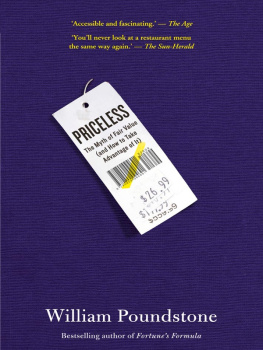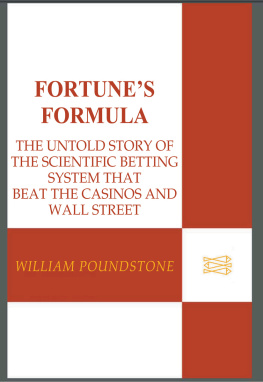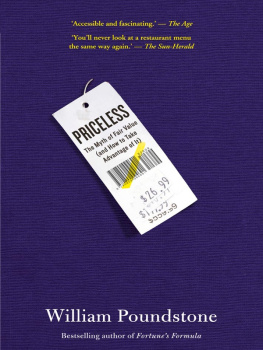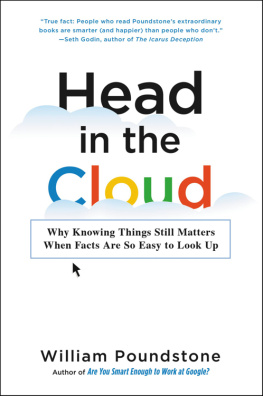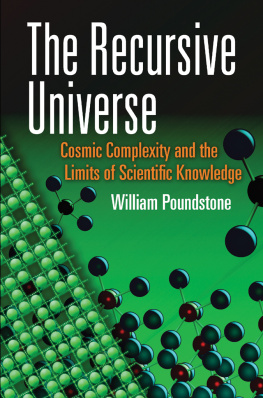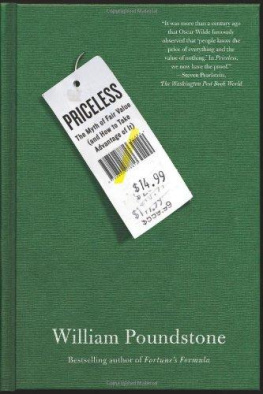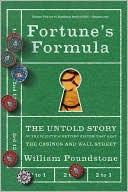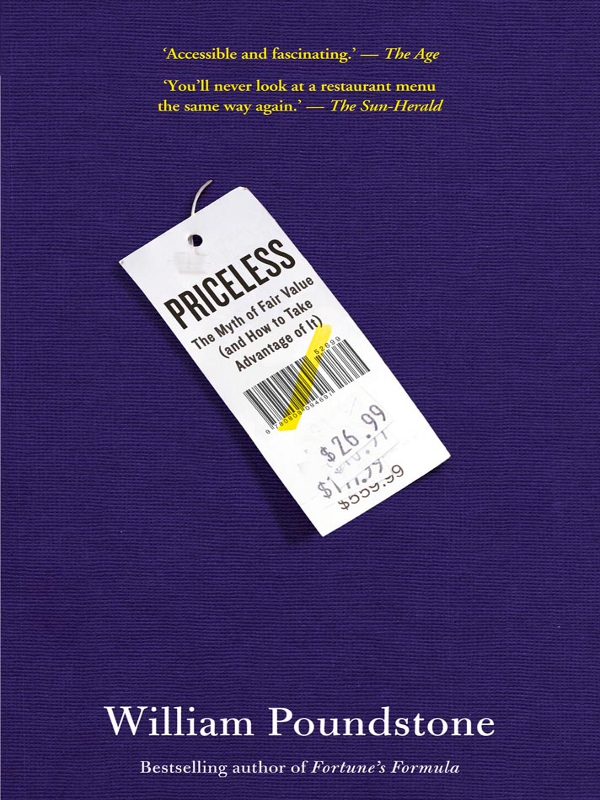
Scribe Publications
PRICELESS
WILLIAM POUNDSTONE is the author of more than ten non-fiction books, including Fortunes Formula:the untold story of the scientific betting system thatbeat the casinos and Wall Street, which was the Amazon Editors Pick for #1 non-fiction book of 2005, and Gaming the Vote: why elections arent fair (andwhat we can do about it). Poundstone has written for The New York Times book review and op-ed pages, The Village Voice, Esquire, Harpers, The Believer, The Economist, and Harvard Business Review. He has appeared on the Today Show, David Letterman, CBS Morning News, Larry King, and hundreds of radio talk-shows throughout the world.
Also by William Poundstone
Big Secrets (1983)
The Recursive Universe (1984)
Bigger Secrets (1986)
Labyrinths of Reason (1988)
The Ultimate (1990)
Prisoners Dilemma (1992)
Biggest Secrets (1993)
Carl Sagan: A Life in the Cosmos (1999)
How Would You Move Mount Fuji? (2003)
Fortunes Formula (2005)
Gaming the Vote (2008)
PRICELESS
the myth of fair value
(and how to take advantage of it)
William Poundstone

Scribe Publications Pty Ltd
PO Box 523
Carlton North, Victoria, Australia 3054
Email: info@scribepub.com.au
First published in the United States by Hill and Wang,
a division of Farrar, Straus and Giroux 2010
Published in Australia and New Zealand by Scribe 2010
This edition published 2011
Copyright 2010 by William Poundstone
All rights reserved. Without limiting the rights under copyright
reserved above, no part of this publication may be reproduced,
stored in or introduced into a retrieval system, or transmitted, in
any form or by any means (electronic, mechanical, photocopying, recording or
otherwise) without the prior written permission of
the publishers of this book.
is copyright 1995 by Edward H. Adelson.
Book design by Jonathan D. Lippincott
National Library of Australia
Cataloguing-in-Publication data
Poundstone, William.
Priceless: the myth of fair value (and how to take advantage of it).
New edition.
9781921753688 (e-book.)
Includes bibliographical references.
1. Willingness to pay.
2. Consumer behavior.
3. Value.
4. Consumer education.
658.8342
www.scribepublications.com.au
To Larry Hussar
Contents
The more you ask for, the more you get
In 1994 an Albuquerque jury awarded Stella Liebeck $2.9 million in damages after she spilled a piping-hot cup of McDonalds coffee on herself. This resulted in third-degree burns and precious little sympathy from the American public. Late-night comics and drive-time DJs turned Liebeck into a punch line. Talk radio pundits saw the lawsuit as Exhibit A to Whats Wrong with Our Legal System. A Seinfeld episode had Kramer suing over spilled coffee, and a website inaugurated the Stella Awardsbooby prizes for the wackiest perversions of the justice system.
Liebecks injuries were no joke. Her grandson had driven her to the McDonalds drive-through window. They bought the coffee, then pulled over and stopped the car so that Mrs. Liebeck could add cream and sugar. She steadied the cup between her legs as she pried off the lid. Thats when it spilled. Liebeck racked up $11,000 in medical bills for skin grafts on her groin, buttocks, and thighs. The tricky question was, how do you put a price on Liebecks suffering and McDonalds culpability?
Liebeck initially asked the fast-food chain for $20,000. McDonalds dismissed that figure and countered with a buzz-off offer of $800.
Liebecks attorney, New Orleansborn S. Reed Morgan, had ridden in this rodeo before. In 1986 he sued McDonalds on behalf of a Houston woman who also had third-degree burns from a coffee spill. In his most mesmerizing Deep South baritone, Morgan advanced the legally ingenious theory that McDonalds coffee was defective because it was too hot. McDonalds quality control people said the coffee should be served at 180 to 190 degrees Fahrenheit, and this was shown to be hotter than some other chains coffee. The Houston case was settled for $27,500.
Morgan monitored subsequent coffee lawsuits closely. He knew that in 1990 a California woman had suffered third-degree burns from McDonalds coffee and settled, with no great fanfare, for $230,000. There was one big difference. In the California case, it was a McDonalds employee who had spilled coffee on the woman.
Since Liebeck had spilled the coffee on herself, logic would say that her case was worth a lot less than $230,000. Morgan ignored that precedent and used a controversial psychological technique on the jury. I will describe that in a moment. For the time being, I will represent it with a row of dollar signs:

The technique worked. As if hypnotized, the jury awarded Liebeck just under $2.9 million. That was $160,000 in compensatory damages plus $2.7 million in punitive damages. It took the jury four hours to decide. Reportedly, some jurors wanted to award as much as $9.6 million, and the others had to talk them down.
Judge Robert Scott apparently thought the jury award was as outlandish as almost everyone else in America did. He slashed the punitive damages to $480,000.
Even with the reduced award, an appeal from McDonalds was inevitable. The eighty-one-year-old Liebeck wasnt getting any younger. She soon settled with McDonalds for an undisclosed amount said to be less than $600,000. She must have recognized that she had hit a home run and wasnt likely to repeat it.
Skippy peanut butter recently redesigned its plastic jar. The jar used to have a smooth bottom, explained Frank Luby, a price consultant with Simon-Kucher & Partners in Cambridge, Massachusetts. It now has an indentation, which takes a couple of ounces of peanut butter out of the product. The old jar contained 18 ounces; the new one has 16.3. The reason, of course, is so that Skippy can charge the same price.
That dimple at the bottom of the peanut butter jar has much to do with a new theory of pricing, one known in the psychology literature as coherent arbitrariness. This says that consumers really dont know what anything should cost. They walk the supermarket aisles in a half-conscious daze, judging prices from cues, helpful and otherwise. Coherent arbitrariness is above all a theory of relativity. Buyers are mainly sensitive to relative differences, not absolute prices. The new Skippy jar essentially amounts to a 10 percent increase in the price of peanut butter. Had they just raised the price 10 percent (to $3.39, say), shoppers would have noticed and some would have switched brands. According to the theory, the same shopper would be perfectly happy to pay $3.39 for Skippy, just as long as she doesnt know theres been an increase.
Luby holds a physics degree from the University of Chicago. In his job as price consultant, he more often thinks like a magician. Like a skillful conjurer, he is asked to manage what buyers notice and remember. Skippy peanut butters customers often have small children and purchase it so regularly that they remember the last price they paid. For such products, consultants recommend creative ways of invisibly shrinking packages. In summer 2008 Kelloggs phased in thinner boxes of Cocoa Krispies, Froot Loops, Corn Pops, Apple Jacks, and Honey Smacks cereals. No one noticed. Shoppers just see the boxs width and height on the shelf; by the time they reach for the box, the decision has been made and theyre thinking of something else.
Next page
